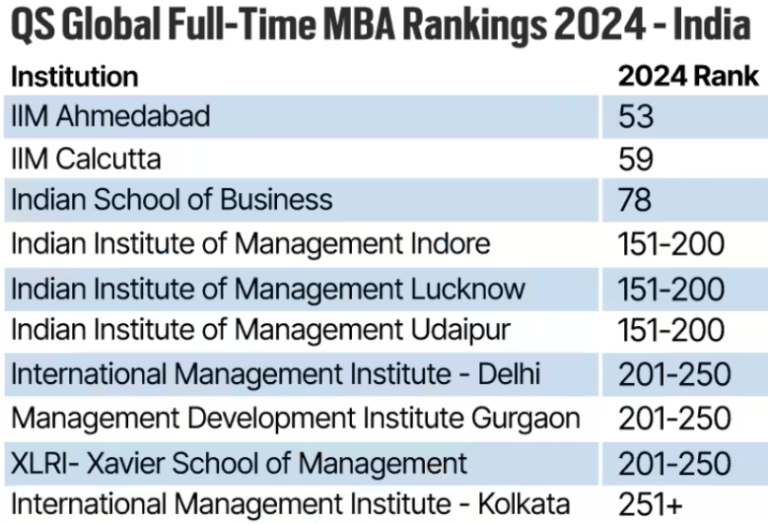The QS World University Rankings for MBA programmes were released on 25th Oct,2023 as per the data shared Indian Institute of Management (IIM) Bangalore has elevated its position from 50th in the 2023 rankings to 48th in 2024. IIM Ahmedabad and IIM Calcutta have been ranked in the 53rd and 59th ranks respectively in QS Global Full-Time MBA Rankings 2024 – India.
Why Indian Institutions aren’t figuring prominently at World Rankings
QS (Quacquarelli Symonds) has been producing the World University Rankings since 2004 to give students worldwide an independent, objective and data informed tool to help them choose the right university. There are thousands of universities around the world, and as higher education becomes more accessible, it’s vital to maintain a benchmarked comparison of them over time.
7 Indian Universities in Top 100 in QS Asia Universities Ranking 2023
How has QS designed its methodology?
The QS World University Rankings methodology has been designed to be accessible, globally relevant, and stable. The QS World University Rankings are released annually. The 2023 edition featured 1418 institutions across 100 locations.
QS Ranking. Financial Times Ranking 2022
The rankings are based on a methodology that considers a range of factors, including academic reputation, employer reputation, research impact, and internationalization. The methodology is reviewed annually to ensure that it remains relevant and up-to-date.
- Academic reputation (40%) – 30% before 2024 :Accounting for 40% of the overall score, academic reputation relates to academic excellence and the scholarly esteem in which the world’s universities are held
- Faculty/student ratio (15%) – 10% before 2024: This indicator accounts for 15% of a university’s score in the rankings.
- Citations/faculty (20%): Citations of published research are among the most widely used inputs to national and global university rankings,which accounts for 20% of a university’s score in the rankings.
- Employer reputation (15%) – 10% before 2024: QS’ Employer Reputation indicator is obtained using another survey, like Academic Reputation, and accounts for 15% of an institution’s overall score.
- Internationalization (10%): The final 10% of a university’s score is derived from measures intended to capture their internationalization: half from their percentage of international students, and the other half from their percentage of international staff.
- Others (15%) – starting from 2024: Starting from 2024, QS has implemented three ( International Research Network, Employment Outcomes, Sustainability) new indicators to reflect the shifts in higher education. Each of them accounts 5% of the total weightage.
Stanford, Harvard & Wharton top QS World Ranking for B Schools
IIM Bangalore is the only Indian MBA among the top 50 for return on investment, in which it is placed in the 31st rank. It is also the national leader for thought leadership. As many as two Indian MBA institutes are among the world’s 50 best for employability. IIM Bangalore is placed 39th globally and fourth highest in Asia, followed by IIM Calcutta in 46th, ranking seventh in Asia.
Further, the leading positions in this year’s rankings are dominated by institutions from the United States: Stanford Graduate School of Business (1st), Penn (Wharton) (2nd), and Harvard Business School (3rd). They are followed by London Business School in the UK and HEC Paris in France, securing the fourth and fifth places, respectively.
The Indian School of Business, with campuses in Hyderabad and Mohali, holds the 78th position in the QS rankings (ranking 4th in India). Following closely are IIM Indore, IIM Lucknow, and IIM Udaipur, all placed in the 151-200 band.




